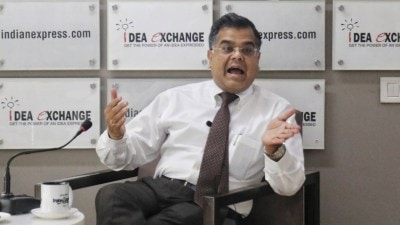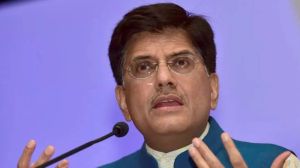Six years in verse
This column is dedicated to that arbiter of good taste and exemplar of political etiquette, the Hon8217;ble Shri Pramod Mahajan, Minister ...

This column is dedicated to that
arbiter of good taste and exemplar of political etiquette, the Hon8217;ble Shri Pramod Mahajan, Minister of Manners.
I am amused by the BJP8217;s desperate attempt to convert the forthcoming Lok Sabha election into a political beauty contest between an octogenarian Dritharashtra, as Ram Jethmalani has so aptly described Vajpayee, and a reluctant debutante who has conclusively established her political appeal by winning far more states in her first six years at the helm than Vajpayee has in his last six as the NDA8217;s Numero Uno which, for Pramod Mahajan8217;s benefit, I take the liberty of translating from the Italian as 8220;Ek Numbari8221;. That they seek to do so only shows how dimly does their India shine. Else, why put all their eggs in one crumbling basket?
But battle having been joined, what alternative does one have to descending to their level? So, here goes. Sonia Gandhi, of course, is no freedom fighter. She could hardly have been one, given that she was born on December 9, 1946, the day the Constituent Assembly first met, to go by a plaque prominently displayed in Central Hall. She is only as old as our sovereignty. Not so Vajpayee. He is the first prime minister India has ever had who could have fought for the country8217;s freedom but refrained from doing so. Indeed, arrested in a Quit India demonstration in August 1942, he pleaded before a colonial court that he had done the Imperial Power no harm 8220;maine kuch nuksan nahi kiya8221;. Of course, he was then but a callow youth of some seventeen summers, so one can hardly take that statement as a confession of treachery. But when one considers that his mentor, Shyama Prasad Mookherjee, was in that historic year of 1942 in cross-communal co-habitation in the Bengal Government with Fazlul Haq of Jinnah8217;s party, both pledging fealty to the Crown at the precise moment Gandhiji was proclaiming 8220;Karenge ya Marenge8221;, one needs to ask whether Vajpayee8217;s court performance was an innocent youthful prank or the first expression of his political preferences? For let none forget that it is the same young Atal Bihari Vajpayee who became secretary to the first president of the Bharatiya Jana Sangh, the self-same Shyama Prasad Mookherjee. So, did Vajpayee accuse himself of having done the Brits no harm because: a he dearly wished them no harm? Or b he did not sympathise with the aims or methods of the freedom movement for the reasons set out by his mentor? Or c because in the unequal struggle between the satyagrahis and His Majesty, the Brits in 1942 looked as if they might be the winning side?
Next, as the first Gen X of independent India, Vajpayee could have joined a secular movement. He chose instead to proclaim Hindutva on his bhagwa dhwaj saffron banner. He said in the middle of the Gujarat carnage in 2002 that his Hindutva is Swami Vivekananda8217;s. Curious that. For Swamiji died twenty years before Vinayak Damodar Savarkar first invented the word in 1922 8212; precisely to distinguish Hindutva from Hinduism. Savarkar, as a self-proclaimed and life-long atheist, had nothing to do with the spiritual dimension of religion. Hindutva, he translated into English as 8220;Hindudom8221; or 8220;Hinduness8221;, but certainly not as Hinduism. Swami Vivekananda, on the other hand, understood Hinduism as a body of spiritual beliefs. He never used the word 8220;Hindutva8221; 8212; for the good reason that no one used the word till Savarkar, decades later, wove it out of thin air while supplicating the Brits to let him out of prison.
So if Vajpayee8217;s 8220;Vivekananda Hindutva8221; is a non-existent figment of a perfervid imagination, then what of his economic policies? Is he the Milton Friedman of Indian economics, or does he believe in 8220;Gandhian socialism8221; 8212; a term he coined as his party8217;s political ideology when in 1980 he became the founder-president of the Bharatiya Janata Party? Of course, he claimed after his faux pas in Long Island, NY, USA, that as PM he was a swayamsevak 8220;in the service of the nation8221;, but before that he was certainly a swayamsewak of a more menacing kind 8212; a lifelong acolyte of the RSS. Nothing much wrong with that, you might say 8212; after all, our democracy allows for membership of any legitimately constituted organisation, however bizarre its views. But, then, what prevents Vajpayee from saying so? Many politicians think they can get away with fooling all of the people all of the time; but Vajpayee is the only one who thinks he can get away with fooling himself all of the time! Is he a socialist 8212; or is he not? Is he a Gandhian 8212; or is he not? If he was a Gandhian and a socialist once but is not one any longer, when did he stop being one? And why? Or is that it was fashionable to be a socialist in the eighties, and so he was a socialist? And as it is now fashionable to be a market-wallah, he is a market-wallah?
Let us come to his six years as prime minister. Most statesmen aspire to high office because they want to implement their alternative programme. Vajpayee is the first PM in recorded history to have stayed PM for six years entirely by keeping to one side his own programme to implement someone else8217;s! Did the BJP, in its present and past incarnations, really struggle fifty years to make it to government only to out-Congress the Congress? Or is it that principles, programmes and policies are, in Vajpayee8217;s view, only rungs to be clambered over to reach 8212; and stay 8212; at the top?
Silver-tongued oratory is, of course, a great asset in a political leader. But when the poet gets the better of the politician, is Vajpayee being Poet or PM when he says talks with the Kashmiri discontents will be held not within the framework of the Constitution but 8220;insaniyat ke dayire mein8221; within the framework of humanity? Does that mean there is no humanity in our Constitution? Or does it mean that humanity lies beyond the Constitution? Or does it mean nothing at all 8212; just 8220;ki tuk jam gaya8221; the verse has rhymed?
- 01
- 02
- 03
- 04
- 05































